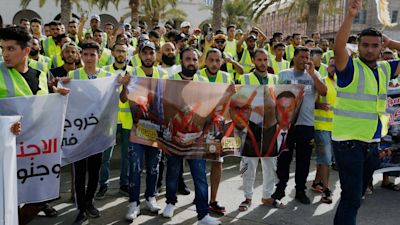Libyan protesters storm into parliament building amid widespread demonstrations

Angry demonstrators in Libya stormed the parliament’s headquarters as part of protests in several cities against the political class and deteriorating economic conditions.
Hundreds of protesters marched in the streets of the capital Tripoli and other Libyan cities on Friday, with many setting fire to government buildings, including the House of Representatives in the eastern city of Tobruk.
Stephanie Williams, the United Nations special adviser on Libya, came out to criticise the events on Twitter.
“The people’s right to peacefully protest should be respected and protected but riots and acts of vandalism such as the storming of the House of Representatives headquarters late yesterday in Tobruk are totally unacceptable,” she said.
Friday’s protests came a day after the leaders of the parliament and another legislative chamber based in Tripoli failed to reach an agreement on elections during UN-mediated talks in Geneva.
The dispute now centres on the eligibility requirements for candidates, according to the UN.
Libya failed to hold elections in December following challenges involving legal disputes, controversial presidential hopefuls and the presence of rogue militias and foreign fighters in the country.
The failure to hold the vote was a major below to international efforts to bring peace to the Mediterranean nation.
It has opened a new chapter in its long-running political impasse, with two rival governments now claiming power after tentative steps toward unity in the past year.
The protesters, frustrated from years of chaos and division, have called for the removal of the current political class and elections to be held.
Want a quick and expert briefing on the biggest news stories? Listen to our latest podcasts to find out What You Need To Know
They also rallied against dire economic conditions in the oil-rich nation, where prices have risen for fuel and bread and power outages are a regular occurrence.
There were fears that militias across the country could quash the protests as they did in 2020 demonstrations when they opened fire on protesters.
Sabadell Jose, the European Union envoy in Libya, called on protesters to “avoid any type of violence.”
He said Friday’s demonstrations showed that people want “change through elections and their voices should be heard.”
Libya has been wrecked by conflict since a NATO-backed uprising toppled and killed longtime dictator Moammar Gadhafi in 2011.
The country was then for years split between rival administrations in the east and west, each supported by different militias and foreign governments.